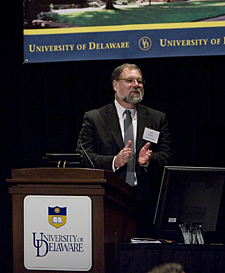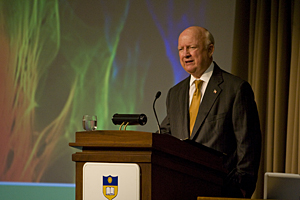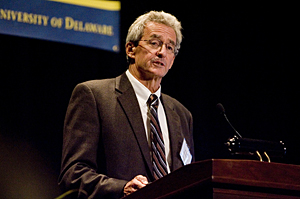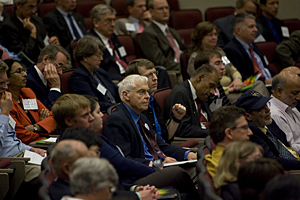


- Rozovsky wins prestigious NSF Early Career Award
- UD students meet alumni, experience 'closing bell' at NYSE
- Newark Police seek assistance in identifying suspects in robbery
- Rivlin says bipartisan budget action, stronger budget rules key to reversing debt
- Stink bugs shouldn't pose problem until late summer
- Gao to honor Placido Domingo in Washington performance
- Adopt-A-Highway project keeps Lewes road clean
- WVUD's Radiothon fundraiser runs April 1-10
- W.D. Snodgrass Symposium to honor Pulitzer winner
- New guide helps cancer patients manage symptoms
- UD in the News, March 25, 2011
- For the Record, March 25, 2011
- Public opinion expert discusses world views of U.S. in Global Agenda series
- Congressional delegation, dean laud Center for Community Research and Service program
- Center for Political Communication sets symposium on politics, entertainment
- Students work to raise funds, awareness of domestic violence
- Equestrian team wins regional championship in Western riding
- Markell, Harker stress importance of agriculture to Delaware's economy
- Carol A. Ammon MBA Case Competition winners announced
- Prof presents blood-clotting studies at Gordon Research Conference
- Sexual Assault Awareness Month events, programs announced
- Stay connected with Sea Grant, CEOE e-newsletter
- A message to UD regarding the tragedy in Japan
- More News >>
- March 31-May 14: REP stages Neil Simon's 'The Good Doctor'
- April 2: Newark plans annual 'wine and dine'
- April 5: Expert perspective on U.S. health care
- April 5: Comedian Ace Guillen to visit Scrounge
- April 6, May 4: School of Nursing sponsors research lecture series
- April 6-May 4: Confucius Institute presents Chinese Film Series on Wednesdays
- April 6: IPCC's Pachauri to discuss sustainable development in DENIN Dialogue Series
- April 7: 'WVUDstock' radiothon concert announced
- April 8: English Language Institute presents 'Arts in Translation'
- April 9: Green and Healthy Living Expo planned at The Bob
- April 9: Center for Political Communication to host Onion editor
- April 10: Alumni Easter Egg-stravaganza planned
- April 11: CDS session to focus on visual assistive technologies
- April 12: T.J. Stiles to speak at UDLA annual dinner
- April 15, 16: Annual UD push lawnmower tune-up scheduled
- April 15, 16: Master Players series presents iMusic 4, China Magpie
- April 15, 16: Delaware Symphony, UD chorus to perform Mahler work
- April 18: Former NFL Coach Bill Cowher featured in UD Speaks
- April 21-24: Sesame Street Live brings Elmo and friends to The Bob
- April 30: Save the date for Ag Day 2011 at UD
- April 30: Symposium to consider 'Frontiers at the Chemistry-Biology Interface'
- April 30-May 1: Relay for Life set at Delaware Field House
- May 4: Delaware Membrane Protein Symposium announced
- May 5: Northwestern University's Leon Keer to deliver Kerr lecture
- May 7: Women's volleyball team to host second annual Spring Fling
- Through May 3: SPPA announces speakers for 10th annual lecture series
- Through May 4: Global Agenda sees U.S. through others' eyes; World Bank president to speak
- Through May 4: 'Research on Race, Ethnicity, Culture' topic of series
- Through May 9: Black American Studies announces lecture series
- Through May 11: 'Challenges in Jewish Culture' lecture series announced
- Through May 11: Area Studies research featured in speaker series
- Through June 5: 'Andy Warhol: Behind the Camera' on view in Old College Gallery
- Through July 15: 'Bodyscapes' on view at Mechanical Hall Gallery
- More What's Happening >>
- UD calendar >>
- Middle States evaluation team on campus April 5
- Phipps named HR Liaison of the Quarter
- Senior wins iPad for participating in assessment study
- April 19: Procurement Services schedules information sessions
- UD Bookstore announces spring break hours
- HealthyU Wellness Program encourages employees to 'Step into Spring'
- April 8-29: Faculty roundtable series considers student engagement
- GRE is changing; learn more at April 15 info session
- April 30: UD Evening with Blue Rocks set for employees
- Morris Library to be open 24/7 during final exams
- More Campus FYI >>
Editor's Note: To read the complete text of the remarks by Energy Secretary Samuel Bodman, click here.
3:13 p.m., Sept. 22, 2008----Attendance at the inauguration of the University of Delaware Energy Institute (UDEI) at Clayton Hall on Friday, Sept. 19, topped 300, with participants at the event representing not only UD but also state and local government and a broad array of private companies, public transit providers, hospitals, utilities, conservancies and foundations.
The purpose of the new institute is to create and integrate new solutions to challenges in energy sufficiency and sustainability.
The daylong program included discussion of a collaborative approach to global energy challenges by U.S. Secretary of Energy Samuel Bodman, highlights of an approach to securing our nation's energy future by U.S. Sen. Thomas Carper (D-Del.) and an overview of UD's Initiative for the Planet by University President Patrick Harker. U.S. Rep. Michael Castle (R-Del.) also spoke briefly during an impromptu post-luncheon session.
Richard Rocheleau, EG '73 PHD '80, who earned bachelor's and doctoral degrees in chemical engineering at UD, gave a special luncheon presentation on the Hawaii Clean Energy Initiative. Other speakers included Delaware Lt. Gov. John Carney; Richard Swanson, president of SunPower; Peter Mandelstam, president of Bluewater Wind; and Tom Gage, CEO of AC Propulsion.
In opening the program, UDEI Director Mark Barteau referred to the institute as “a portal to energy research and education at UD.” He emphasized that UDEI will also play an important role in engagement. “We're not just staying in the lab and the classroom,” he said, “but getting out there and trying to connect outside the walls of the University.”
Barteau, who also serves as senior vice provost for research and holds the Robert L. Pigford Chair of Chemical Engineering at UD, was instrumental in establishing the institute in 2007.
Harker emphasized that UDEI is an action step on UD's Path to ProminenceTM, which includes, as one of six milestones, the Initiative for the Planet. “This initiative has among its goals that the University of Delaware will lead path-breaking environmental research, that it will become 'The Green University,' that it will develop and demonstrate alternative energy technologies and that it will integrate environmental programs within the curriculum,” Harker said.
“The Energy Institute will develop the science undergirding advances in emerging energy technologies and will advance their development and deployment,” he continued. “It will leverage our strengths in partnerships with industry and government, developing and coordinating efforts on campus and off.”
In addition, the institute will take a leadership role in major grant proposals and provide seed grants to launch innovative energy projects.
Harker also announced the establishment of the Center for Carbon-Free Power Integration, which will explore connection and storage issues related to wind and other intermittent energy sources. “We are also exploring the formation of a Center for Advanced Magnetics,” he said, “a topic of great importance in building more energy-efficient devices.”
“Each of these centers is an important part of the University of Delaware's efforts to advance energy science, technology and policy,” Harker continued, “but just as there is no 'silver bullet' for our national energy needs, no one discipline, no one technology can do the job alone.”
The slate of speakers on the program reflected this belief, as talks addressed photovoltaics, wind power, electric cars, biofuels and other innovative approaches to providing energy and reducing harmful emissions.
If developing alternative energy sources and mitigating impacts on the environment were the mandates of the day, partnerships were proposed as the means to those ends.
“We have the capability in this country to lead the way to an energy-secure future through unique partnerships and business models,” said Uma Chowdhry, senior vice president and chief science and technology officer at the DuPont Company. “Partnerships are the key to success, bringing collective capability together to face mega-challenges and create a sustainable future.”
Chowdhry, who is currently a member of UD's College of Engineering Advisory Council, discussed a number of energy innovations under development by DuPont through collaborations. Projects include advanced biofuels such as biobutanol, sustainable building materials, advanced materials for photovoltaic modules and cellulosic ethanol.
Bodman presented a number of government initiatives aimed at improving energy efficiency and developing renewable energy technologies. “The bottom line is that to address this major energy challenge, we need everyone,” he said. He referred to UD, with its many contributions to the field of energy research, as a valued partner.
“For this collaboration to continue on the scale that we need,” Bodman said, “we must invest in the next generation of leaders, mathematicians, scientists and engineers to steer us through the technological challenges facing us. By providing a forum for fostering collaboration, this university and UDEI will help lead us toward a cleaner, more affordable, more secure energy future.”
Both Carper and Castle echoed Bodman's emphasis on the importance of collaboration and on Delaware's potential to play an important role in the nation's energy future.
“With the right kind of collaboration across disciplines and with the establishment of meaningful projects,” Carper said, “there is much we can do to help meet America's need for national energy security.”
“We have an opportunity here to be leaders we have the expertise, we have the corporate background, and we are a small flexible state where people care about making a difference,” Castle said.
Rocheleau, director of the Hawaii Natural Energy Institute (HNEI) at the University of Hawaii, provided an overview of the Hawaii Clean Energy Initiative, which is a state/DOE partnership established to accelerate transformation of Hawaii's energy system.
Research at HNEI is ongoing in a number of areas--including hydrogen, fuel cells, photovoltaics, electrochemical power, ocean resources, biomass and biotech--to address Hawaii's unique energy needs and issues.
In closing the program, Barteau pointed to a number of other energy-related centers at UD whose ongoing activities will complement the efforts of UDEI. These include the new Center for Carbon-Free Power Integration, which will be housed within the College of Marine and Earth Studies, as well as the Institute of Energy Conversion, the Center for Energy and Environmental Policy, the Center for Fuel Cell Research, the Center for Catalytic Science and Technology, and the Solar Power Program.
“We need a full range of technologies to meet our energy and environmental needs,” Barteau said. “But technology alone is not enough. We also need commitment, and we started the UDEI because we believe that failure is not an option.”
Article by Diane Kukich
Photos by Kathy Atkinson



